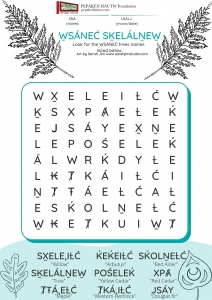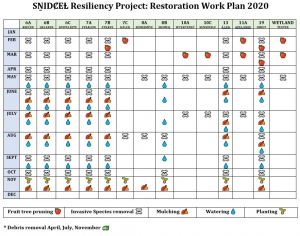Archived Updates
December 15, 2021 –
University of Victoria –
A unique, Land-Based Experiential Learning course, HSD 460 (CRN 23991), beginning in January of 2022 has space available!
Offered by the Division of Human and Social Development, this course will be taught by Nick Claxton (Academic Director of Living Lab).
November 3, 2021 –
Please enjoy our Fall 2021 Newsletter where you can read about an eventful summer, highlights from our youth camps and community-campus projects, and the plans we have coming up for the Fall and Winter 2021-2022 season.
If you have any events or information to share on our website or for any questions and comments, please get in touch at [email protected].
September 23, 2021 –
Job Posting
Program Lead or Post-doc – Community-engaged Nature-based Climate Solutions for Water.
The primary goal of this ECCC-funded project is to empower rural and Indigenous communities across Canada to mitigate both water stress induced by climate change, and local loss of nature/biodiversity through an integrated and scalable nature-based climate solutions (NBCS) toolkit/solutions bundle for water sustainability. The position will focus on co-creating this toolkit with community partners, in respectful and reciprocal ways that combine water science/governance, environmental justice, and community engagement. The position is from 1 to 5 years in duration, with a salary range of $50,000-$60,000 plus benefits. Working group: Dr. Kris Dubrawski, Canada Research Chair in Rural and Indigenous Water Sustainability, Department of Geography and Civil Engineering, Dr. Crystal Tremblay, Geography, Special Advisor on Community-Engaged Scholarship; Dr. Eric Higgs, Environmental Studies; Dr. Nick XEMŦOLTW̱ Claxton, Human and Social Development; Dr. Nancy Shackelford, Environmental Studies; UVic Living Lab Project, and several community group partners. Applicants should have a relevant PhD or significant experience working with communities/nature/water. We actively encourage applications from members of groups experiencing barriers to equity.
How to Apply: Please email [email protected] with “NBCS Program Lead or Post-doc” as the subject with an introduction and CV. Applications will begin being reviewed on October 8. We look forward to seeing your application!
Kristian (Kris) Dubrawski (he/him) | Assistant Professor, Civil Engineering/Geography | Canada Research Chair | University of Victoria | ECS Building, room 466, Victoria, BC, Canada | Unceded W̱SÁNEĆ, Lək̓ʷəŋən and Wyomilth Territories | 250-472-5758 |
September, 2021 –
-
- UVic Conversation: Living Lands and Indigenous Climate Solutions: Responsibilities beyond Territorial Acknowledgements, https://www.uvic.ca/climate-solutions/living-lands/index.php
- Amalis Riera Vuibert, a researcher with the Fisheries, Ecology and Marine Conservation Lab at UVic, shared her story of participating with the Summer 2021 Living Lab Youth Eco-Stewards Program – https://meridian.cs.dal.ca/2021/08/23/listening-under-the-waves-at-tlches/
July 19th, 2021 –
Check out our Summer Newsletter where you can read about our Network Gathering on May 26th, our newest staff members, amazing projects like Decolonize, Decarbonize!, community events, and the new Indigenous Youth Eco-Stewardship Program!
Newsletter – Living Lab Summer Newsletter 2021
May 2021
May 2021 Update – Blossoms Everywhere –
Welcome Desiree and Lyndsey…
Well, life is certainly blossoming around us. On the team front we are thrilled to have Desiree Jones and Lyndsey Joseph join us for the coming months as Living Lab Research and Program Assistants. Both are UVic students; Desiree from W̱SÁNEĆ territory, specifically Pauquachin First Nation, is in her third year of Indigenous Studies. Lyndsey is Lekwungen from the Songhees First Nation and is studying for her Bachelors of Education in Indigenous Language Revitalization (see their team bios on our Team page, under “Program Staff”).
Together, Lyndsey and Desiree will be doing background research on Indigenous resurgence focused on education systems and history in the Salish Sea as part of the new Social Science and Humanities Council of Canada (SSHRCC) grant for 2020-2023. Bringing their amazing backgrounds as students, community members and parents, they are also supporting the Indigenous youth eco-stewardship summer activities and camps, and the Tl’Ches – Songhees – UVic restoration and field school (and community research program) along with UVic Environmental Studies assistant professor Darcy Mathews.
Greetings – Spring 2021 Update
Check out our Spring 2021 Update here – LLSpringNewsletter
Read more about our newest grant here – Indigenous Resurgence in Salish Sea Research Summary
Please enjoy these additional resources from PEPÁḴEṈ HÁUTW̱:
Greetings – It’s Fall 2020… What a year for re-visioning!
Well, despite and/or as a consequence of the major challenges experienced worldwide by COVID-19, projects like Living Lab keep growing in their relevance and impact. Ecocultural restoration and outdoors-focused (land and water-based) education, which supports Indigenous resurgence and is enabled by collaborative community-campus relationships are more relevant than ever.
Summer 2020 Highlights
Activities
- UVic Science Venture has gone virtual and they are available to offer k-12 STEM workshops for schools, community organizations, and other youth serving programs. They are also working on activity booklets and STEM kits to distribute. Check out the online learning portal (https://www.scienceventure.
ca/onlinelearningportal) for STEM activities! Contact the office for more info: [email protected] or call 250-721-8158. - Supported the June 2020 Launch event for ‘To Fish as Formerly’ A Story of Straits Salish Resurgence – Multi-media exhibit at Legacy Gallery- opened by Songhees Elder Bangus- Frank George/Living Lab Liaison https://events.uvic.ca/legacy/view/event/date/20201007/event_id/50122
- The exhibit will be on until November 23rd
- Partnered with the successful 2019-2020 TETACES Climate Action Project Program co-led by the Pender Island Community Resource Society and the W̱SÁNEĆ Leadership Council. See TETACES Report/Action Plans (https://www.sgicommunityresources.ca/climate-action-project/
- Continued to directly support PEPÁḴEṈ HÁUTW̱ restoration programs – see their recent video here: youtube
and visit their website http://pepakenhautw.com/ - PEPÁḴEṈ HÁUTW̱ has also been keeping busy safely doing ecosystem restoration with youth and community members during the covid-19 pandemic. With small groups, they have worked at SṈIDȻEȽ (Tod Inlet, Central Saanich) and QENENIW̱ (Hay Point, Pender Island) to continue the stewardship of these important places. They also created new video and online content to support their students in a distance format. Check out the PEPÁḴEṈ HÁUTW̱ Facebook page and new website for more info!
- Held Lekwungen Living Lab week August 11-14 with 16 Songhees and Esquimalt youth aged 11-22 (Photo Gallery and Project report coming soon!).
- Piloted a Community Water Collaborative project / testing protocols (with the support of the CRD and Oak Bay High School) with the National Science and Education Research Centre. PromoScience support led by UVic Biology Professor John Taylor.
- Continued support for the Coles Bay Action Project (focused on community-based testing and remediation of the beach) led by the Pauquachin Nation and the CRD.
- Began a new partnership/ supported project proposals with the Community Water Innovation Lab with the new UVic Canada Research Chair in Rural and Indigenous Water Sustainability / Professor in Engineering and Geog, Kristian Dubrawski
Support
- Received a new Vancouver Foundation Development Grant to support the development of a ÁLEṈENEȻ Action Plan – W̱SÁNEĆ- led outdoor education/ field school on TETACES (Gulf Islands)
- Received Ministry of Advanced Education 2020-2021 core funding via the UVic Aboriginal Service Plan
- Completed a 2021-2022 Partnership Plan and Proposal for regional science and ecosystem education and a new Indigenous Youth Stewardship Program ( Partners include the CRD, Songhees, Esquimalt and Pauquachin Nations, W̱SÁNEĆ School Board, PEPÁḴEṈ HÁUTW̱ Foundation, Friends of Bowker Creek, Oak Bay High School, the UVic Faculties of Education and Engineering, Departments of Environmental Studies, Civil Engineering, Curriculum and Instruction, Biology, History, Indigenous Education and Geography, UVic Library, Community Engaged Learning and the Office of Indigenous Academic and Community Engagement.)

